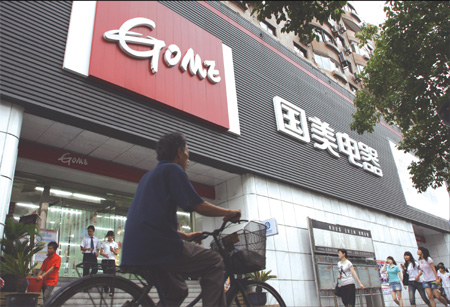Gome's drama: deep pockets vs the long arm of the law
Updated: 2010-03-23 07:35
By Li Tao(HK Edition)
|
|||||||||
|
A man rides past a Gome Electrical Appliances Holdings Ltd store in Shanghai. Huang Guangyu, the billionaire founder of the mainland retailer was finally charged by authorities in Beijing last month, after 15 months in police custody. Kevin Lee / Bloomberg News |
After 15 months in police custody, mainland appliances tycoon Huang Guangyu was finally charged by authorities in Beijing last month. The founder and former chairman of Gome Electrical Appliances Holding was charged with the expected "illegal business dealings", "insider trading", and one unexpected count: "bribery by organization".
A Shanghai based lawyer, Hua Qi from Shanghai Zhongxiaxubo Law Firm, told China Daily that although the new charge sounds like a rare one to the public, it befits the facts.
Hua said "bribery by organization", unlike the commonly referred bribery, has linked the fate of the mainland's former richest man with Gome the company. If the former chairman is found guilty on this charge, Gome will also face a huge fine.
Elaborating, Hua said, "People have doubts, because the maximum penalty on a bribery charge is life imprisonment, but only 5 years for the 'bribery of organization' in this case. The test is to see who enjoys the illegal gains. If the manipulator himself does, he should be charged with normal bribery. If the company is the major beneficiary, then it should apply.
"Huang is a typical rags-to-riches case, and Gome to him is more than just a company. Even though Huang made profits from those illegal dealings, (the prosecution of) his case could also consider the benefits of his company as well; therefore I think the new charge is appropriate," Hua added.
Gome earlier had expressed confidence in its operations and financial condition despite the charge. "The alleged amount involved in the prosecution is 4.56 million yuan. Even if the company is eventually levied a fine, the amount will not exceed a hundredth of the company's expected profit in 2010, which leaves no reason for Gome to make a fuss," said Hua.
Hua said Huang's case reminded him of another Shanghai property tycoon, Zhou Zhengyi, who evaded indictment in Hong Kong years ago.
Zhou was once named the mainland's 11th richest person by Forbes. He was sentenced to 16 years in prison by the Shanghai People's Intermediate Court in November 2007, on charges of bribery, embezzlement and tax fraud.
As early as in 2006, Hong Kong's Independent Commission Against Corruption (ICAC) had already obtained approval from a Hong Kong court to arrest Zhou for manipulating the stock price of the then-Hong Kong-listed Shanghai Land Holdings, dated 2002, a Nongkai subsidiary.
However, only Zhou's wife Sandy Mo was sentenced - to 3 years' imprisonment in Hong Kong for manipulating the price of Shanghai Land shares with the aim of defrauding investors in January 2006.
"Without an extradition agreement, we can't indict him (Zhou) unless he is brought to Hong Kong," a regulator at ICAC said earlier.
Hong Kong's High Court ordered an injunction to freeze part of a HK$1.66 billion asset pool controlled by Huang and his wife Du Juan, following allegations by the Securities and Futures Commission (SFC) last August.
The SFC claimed the pair organized a share repurchase scheme illegally in early 2008 and caused Gome to incur a loss of approximately HK$1.6 billion, which hurt the retailer and its shareholders. SFC said at the time that "the SFC is continuing to liaise with mainland authorities with a view to assisting the court to effect service on them."
But a spokesperson from the watchdog told China Daily that no any further step had been taken in Huang's case since the issuance of the injunction in August.
Lin Feng, an associate professor of Law from City University of Hong Kong, said extradition was still a hot potato tossed between the mainland and Hong Kong, since the two sides adopt different laws and judicial systems.
Hua, the Shanghai lawyer, said that even if Huang were to be sentenced to imprisonment in the mainland, he could still face indictment from Hong Kong after serving the time.
"The lack of relevant coordination now will only make it difficult to take Huang to the court, even if Hong Kong plans to, as long as Huang decides not to show up in the city any more," Hua observed.
The mainland's Securities Regulatory Commission confirmed earlier that Huang was indicted for illegal gains by manipulating the share price of two mainland-listed companies, but refused to elaborate in detail. Reports said Beijing Second Intermediate People's Court will proceed with Huang's case this month.
(HK Edition 03/23/2010 page2)
